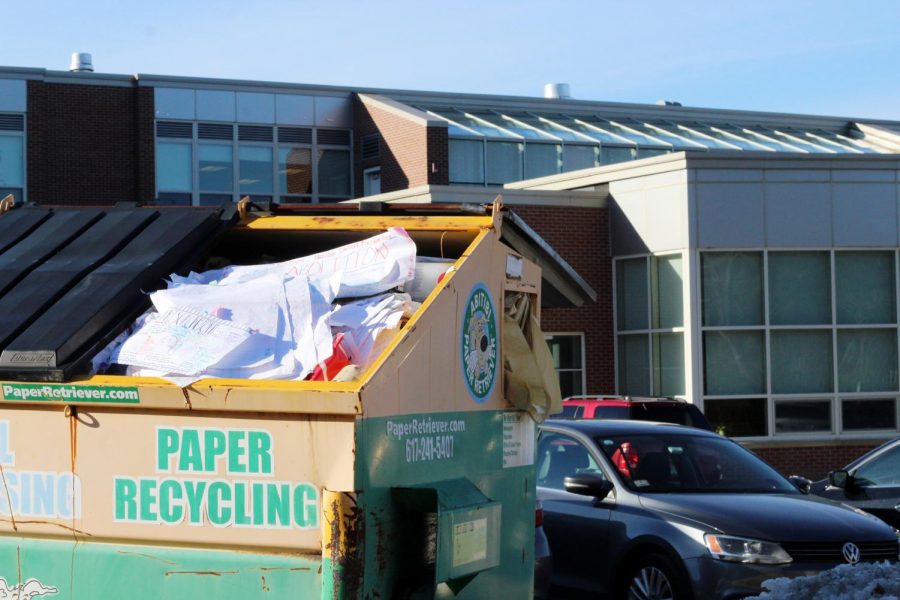Paper piles up as recycling put on hold
White paper recycling bins not emptied since fall
Outside of the library, the Midwest Paper Retriever bin overflows with paper that has been sitting untouched since the fall.
March 14, 2019
As white paper recycling bins fill up and nobody comes to take them, students are left wondering, ‘What happened to our recycling?’.
The school’s white paper specific recycling bins have stopped receiving service since Midwest Paper Retriever, the company who empties the school’s white paper recycling bins, cancelled service to the area this fall. As of March 3, the school has been incorporating white paper into the general single-stream recycling program.
The bins were brought to the school by AbiBow Recycling in 2006 by request of the science department. The bins remained in service under AbiBow until Nov. 14, 2014 when AbiBow Recycling sold the bins to Midwest Paper Retriever LLC.
“The bins haven’t been emptied since the fall, so somehow the company went under,” science teacher Christina Connolly said.
As of now, the bins will stay at Algonquin, and the school is currently trying to find a new vendor to pick up service for the bins. However, it hasn’t been easy.
“I would love to able to say that we will find another company,” Facilities Director Mike Gorman said. “That’s why we left the blue bins in classrooms. We’re hoping that we’ll have another company and can resume our operations the way we were emptying it.”
In the past, white paper recycling has been beneficial for both Algonquin and the companies running pick-up operations. The school had received a small dividend for allowing the previous vendor to pick up white paper to recycle for profit.
However, with many of these operations going out of business, it is apparent that white paper is no longer as profitable as it was in the past. As a result, it is unlikely that Algonquin will be able to find a free vendor for white paper.
“There is money in recycling paper, or historically there has been money in it, but maybe now because these companies have been going under it’s not profitable,” Connolly said.
The option the school chose is to integrate white paper with the rest of the building’s single-stream recycling under the company E.L. Harvey. However, this is at a cost to the school.
Integrating the white paper into our single stream recycling increases the volume requires more effort on the vendor’s end.
“We can have our white paper recycled through E.L. Harvey, but we would have to pay,” Connolly said. “We would be paying less than you pay for trash, but we would still be paying whereas in the past recycling white paper didn’t cost us anything, and, in fact, we got like five dollars [A month] for doing it.”
Until a long-term solution is reached, students are encouraged by sophomore and head of the Green Earth Club Ben Westphal to work to conserve paper independently and motivate each other to become more eco-friendly.
“Because we don’t have a white-paper vendor, we should reduce our white paper use,” Westphal said. “Now that we have bring your own device we could definitely type stuff up instead of using white paper and use our computers until we can get another company that will recycle our white paper.”











